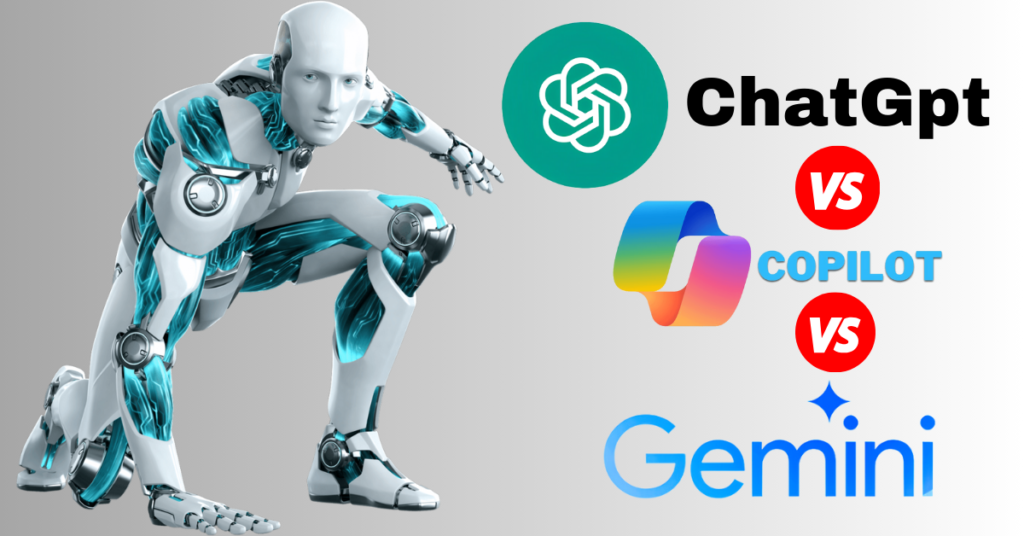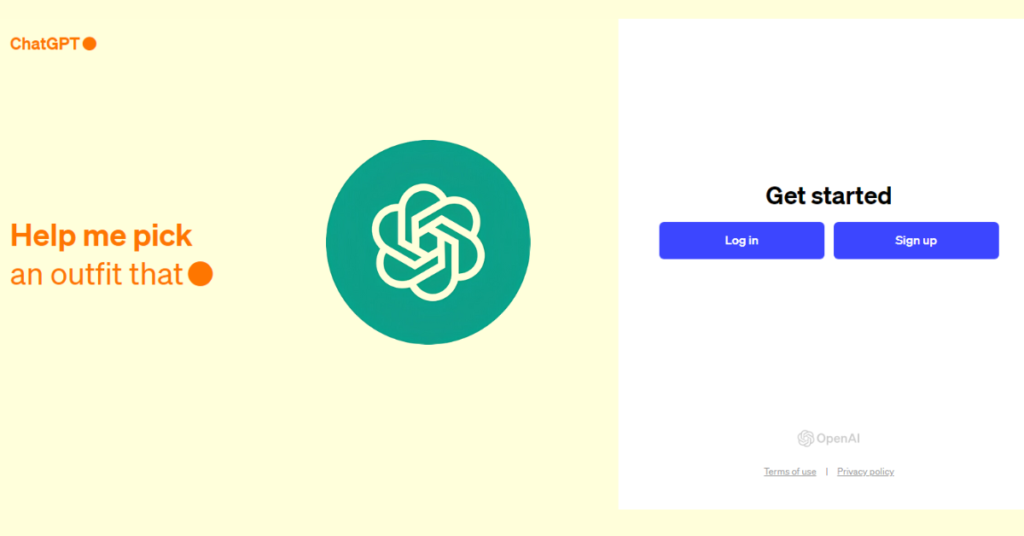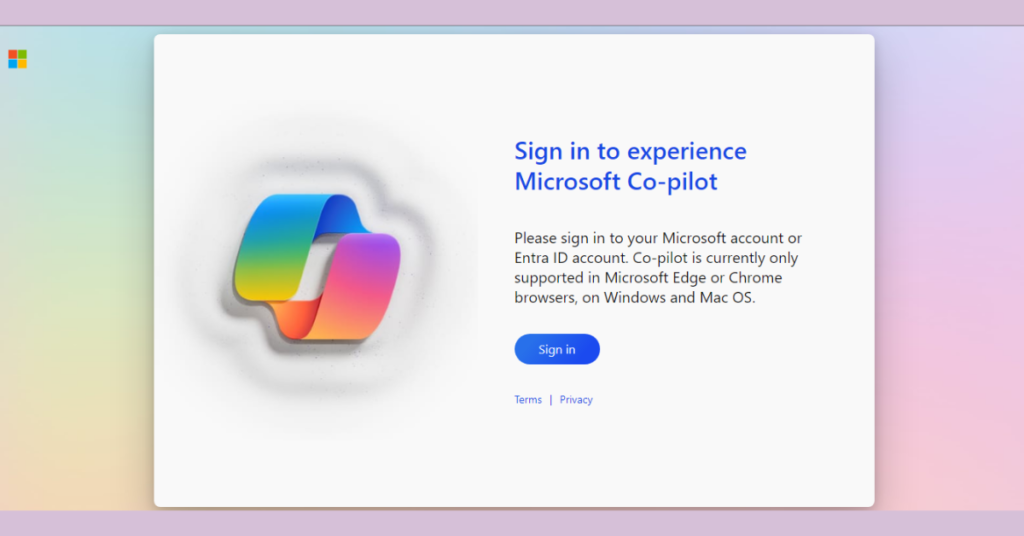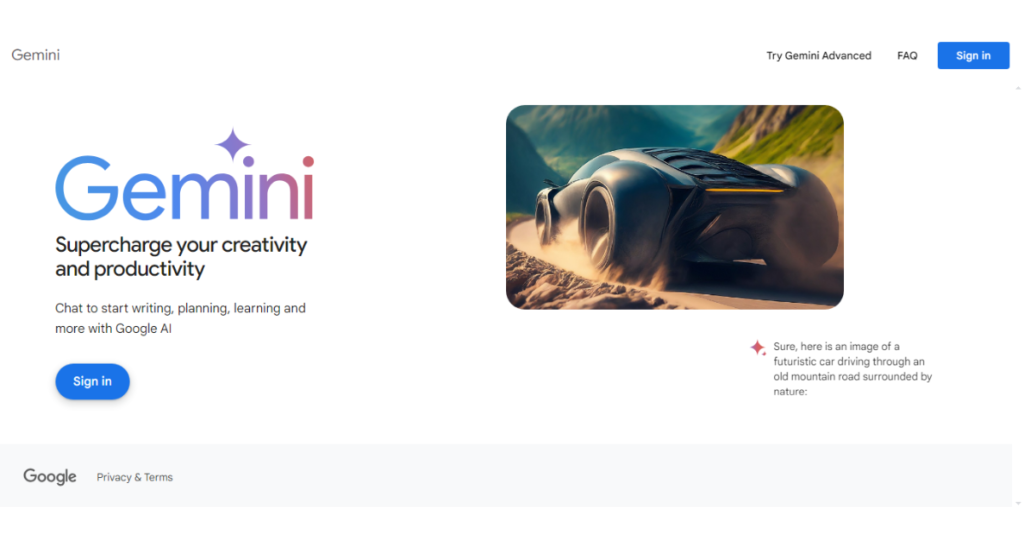ChatGPT Vs Microsoft Copilot Vs Google Gemini: Which AI Assistant Should You Use? Find out in this in-depth comparison of the leading conversational AI platforms. We contrast ChatGPT, Copilot, and Gemini across accuracy, capabilities, ideal use cases, limitations, training data, privacy, and future potential.
In this modern era of Technology with Artificial Intelligence, three AI chatbots are most popular all around the world Chatgpt by OpenAi, Copilot by Microsoft and Gemini by Google. These Ai Chatbots have their unique features and qualities, so today we decided to do comparison between these Ai Assitant Tools.
In this Ultimate Guide Chatgpt Vs Microsoft Copilot Vs Google Gemini we will figure out Which Ai Chatbot is the best by measuring their strengths and weaknesses .

See how ChatGPT delivers advanced natural language processing, Microsoft Copilot accelerates coding, while Google Gemini focuses on concise factual answers. Get clarity on the specialized strengths and downsides of each AI tool. Rapid improvements in AI will shape many industries – learn how to pick the right assistant for your needs. Read this comprehensive guide comparing ChatGPT vs Copilot vs Gemini now.
Introduction
Artificially intelligent conversational agents like ChatGPT, Microsoft Copilot, and Google Gemini are rapidly transforming how we search for information, write content, and code applications.
With impressive language capabilities and specialized skills, these AI assistants seem like magic. But they have distinct strengths, weaknesses, and ideal use cases.
This in-depth guide will compare Chatgpt Vs Microsoft Copilot Vs Google Gemini across crucial categories like accuracy, capabilities, limitations, and more. We’ll help you determine which AI best fits your needs.
By the end, you’ll understand:
- Key differences between the leading AI chatbots
- The unique capabilities of each platform
- Ideal use cases where each assistant excels
- Limitations to be aware of
- How ChatGPT, Copilot, and Gemini are likely to evolve
Let’s start by examining the background and core features of each AI tool.
Key Differences Between the AI Assistants
Here is a high-level overview comparing ChatGPT, Copilot, and Gemini:
| ChatGPT | Copilot | Gemini | |
|---|---|---|---|
| Created By | OpenAi | Microsoft | |
| Key Capability | Conversational AI | Coding Assistant | Answers questions, summarizes, translates |
| Specialized For | Natural Language | Writing Code | Pulling sentence-level facts |
| Data Training | Public dialog data | OpenAI code, GitHub data | Private Google data |
| Release Date | November 30, 2022 | November 1, 2023 | December 6, 2023 |
| Availability | Free public beta | Subscription – Visual Studio | Limited product demonstrated |
This table summarizes the key high-level differences. Next we’ll do a deeper dive into the features and strengths of each AI chatbot alternative.
Do you wanna about know Gemini Advanced vs ChatGpt 4 Comparison ?
What is ChatGPT and What Does It Offer?

ChatGPT is a conversational AI assistant created by San Francisco-based AI safety startup OpenAi. Users can have natural language conversations with ChatGPT, asking questions or discussing topics, with impressively human-like responses.
ChatGPT Capabilities
Some notable features and capabilities of ChatGPT include:
✅ Conversational Abilities: ChatGPT has powerful natural language processing skills and can intelligently answer follow-up questions based on context of the conversation so far.
✅ Diverse Topics: Trained on a massive amount of text dialog data, ChatGPT can discuss an extremely wide range of topics, from technology to relationships to philosophy.
✅ Creative Writing: Whether crafting poems, lyrics, code, or educational content, ChatGPT produces high quality written content tailored to criteria given.
✅ Adapts Responses: It decides what content to generate based on examples and user preferences provided.
Here are some quick use cases where ChatGPT delivers value:
- Research: Compile sources and summarize information about any topic instantly.
- Content Creation: Write SEO blogs, marketing copy, essays, programming solutions based on prompts.
- Conversation: Engage in intelligent discussion across diverse domains.
ChatGPT Limitations
However, there are some key limitations to note:
❌ Inaccuracies: Since ChatGPT doesn’t fact check itself, responses can sometimes be incorrect or biased. Evaluating truthfulness is required.
❌ Hallucinations: When unsure of a response, ChatGPT may “hallucinate” fake details rather than saying “I don’t know”.
❌ Harmful Instruction: It has no filters regarding dangerous, illegal, or unethical suggestions. Commands must be carefully considered before executing.
So in summary, while ChatGPT has unprecedented conversational abilities, it does have weaknesses to be aware of related to truthfulness and safety. Evaluating responses is advised rather than accepting them blindly.
What is Microsoft Copilot and How Does It Work?

Released in 2023, Microsoft Copilot is an AI pair programmer created in partnership with OpenAI, the makers of ChatGPT.
Copilot helps software developers write code more efficiently by suggesting entire lines and blocks of code in real time as they type. It’s like having an AI assistant constantly generating recommendations tailored to your code.
Under the hood, Copilot is powered by machine learning models trained on billions of lines of public code from GitHub as well as natural language understanding neural networks.
Microsoft Copilot Capabilities
Here are some of the key features of Microsoft Copilot:
✅ Code Suggestions: Predicts next lines of code by analyzing meaning and context of code written so far in multiple languages like Python, JavaScript, TypeScript, Ruby.
✅ Autocompletion: Keeps suggesting code as you type with Options to accept or reject recommendations.
✅ Speeds Coding: Saves immense developer time by recommending valid code instantly versus manually writing every line.
When it comes to use cases, Microsoft Copilot provides major productivity gains for:
- Faster Code Development: Get code samples and entire functions suggested automatically to integrate or customize as per your project needs.
- Onboarding New Developers: Great for teaching coding concepts and best practices through its examples.
- Plugging Knowledge Gaps: Learn how to implement unfamiliar tasks by checking Copilot suggestions.
Microsoft Copilot Limitations
However, Microsoft Copilot also comes with some limitations:
❌ Problematic Recommendations: It sometimes suggests incorrect code that doesn’t handle edge cases properly. All code should be rigorously tested.
❌ Limited Natural Language Understanding: While it generates code, Copilot can’t discuss code the way a human peer programmer can. Explanations are limited.
❌ Potential Legal Issues: Since Copilot is trained on publicly available code, there are concerns about potential plagiarism and legal risks for production applications.
So in summary, Microsoft Copilot can boost developer productivity and accelerate coding with its intelligent recommendations. But all code still requires human review, customization, and testing before being deployed.
How is Google Gemini Different From Other AI Tools?

At Google’s annual I/O developer conference in 2022, Senior Vice President Prabhakar Raghavan demonstrated an experimental conversational AI called Google Gemini described as a “radical leap forward”.
Google Gemini Capabilities
While only briefly previewed so far, initial reports suggest Google Gemini will differentiate itself with new approaches like:
✅Multi-Modal Understanding: Combines text, images, and potentially even videos as inputs to ask questions and get highly accurate answers pulled from web pages.
✅ External Knowledge Integration: Directly queries the internet and Google’s search index to instantly deliver factual responses versus trying to store all knowledge internally like ChatGPT does.
✅ Citation of Trusted Online Sources: Gemini explains where each detail in responses comes from with links to authoritative sites, improving transparency.
✅ Summarization: Early demos showed Gemini summarizing key points from a research paper it was given with impressive brevity and accuracy.
Based on what’s been revealed so far about Google Gemini, some potential use cases include:
- Accurate Question Answering: Get facts and definitions easily sourced straight from reputable sites.
- Targeted Summaries: Input long reports or articles and have lengthy details condensed into concise overviews.
- Translations: Early testing showed Gemini handles translations extremely rapidly.
Compared to other alternatives, Google Gemini seems specialized for quickly pulling sentence-level facts from trusted online sources. But it likely lacks the creative storytelling capacities of models like ChatGPT focused on discussing abstract, hypothetical concepts.
Google Gemini Limitations
Since Google Gemini remains under development with details still emerging, some open questions include:
❓Availability: When will it launch? Will Google Gemini be free or paid?
❓Content Moderation: Can it avoid issues with toxicity, bias, misinformation etc?
❓Data Privacy: What user data will feed improvements? How will privacy be maintained?
The sections above provided an overview of ChatGPT, Microsoft Copilot, and Google’s emerging Gemini chatbot. Next, we’ll directly compare their capabilities.
Comparing Chatgpt Vs Microsoft Copilot Vs Google Gemini
Now that we’ve covered the background of each platform, let’s directly compare ChatGPT vs Copilot vs Gemini across key categories:
Accuracy
| Features | ChatGPT | Copilot | Gemini |
|---|---|---|---|
| Accuracy | Prone to incorrect facts without citing sources. Hallucinates when unsure. | Mainly suggests valid code but still requires review and testing. | Too early to evaluate accuracy but potential to be higher given internet sourcing. |
Capabilities
| ChatGPT | Copilot | Gemini | |
|---|---|---|---|
| Language Skills | Extremely advanced natural language processing for discussion | Limited natural language understanding | Too early but expected to be very strong |
| Reading Comprehension | Superior comprehension of context during dialogues | No reading comprehension, focused on code | Likely very advanced comprehension skills |
| Writing Abilities | Creative writing (blogs, poems, lyrics, etc) to specifications | Writes full lines/functions of code in any programming language | No evidence yet of expansive writing abilities |
| Reasoning | Logical reasoning capacity in conversations | Understands program logic to suggest relevant code | So far seems specialized in quick fact retrieval over reasoning |
ChatGPT has groundbreaking natural language capabilities. Copilot excels at accelerating software development through code suggestions. And Gemini so far seems focused on accurately answering factual questions.
Ideal Use Cases
| ChatGPT | Copilot | Gemini | |
|---|---|---|---|
| Best For | Open-domain dialogues, explanations, writing content to order | Programming assistance and code autocomplete for software developers | Concise summaries, definitions, factual question answering sourced from websites |
Each AI assistant has fairly distinct ideal use cases based on current specialized capabilities.
Data and Privacy
There are also key differences in the data used to train these AI models which has implications for accuracy as well as privacy:
| ChatGPT | Copilot | Gemini | |
|---|---|---|---|
| Training Data | Dialogues and text data scraped from public websites by OpenAi | Billions of lines of public code from open source GitHub projects + English texts | Google’s proprietary search corpus and private data |
| Storage of Conversations | OpenAi stores conversations to keep refining ChatGPT but provides opt out | Microsoft stores conversations to improve Copilot but provides opt out | Unknown yet how much convo history will be kept to train Gemini |
| Remaining Questions | Unknown degree of bias in training data. Ongoing debates over API access | Legal uncertainties around code plagiarism allegations. Security vulnerabilities discovered. | Entirely closed off. No transparency into what private data improves it. |
There are open questions around potential biases in training data as well as user privacy for each AI assistant. Google Gemini is the most opaque right now regarding data sources and privacy safeguards. Independent auditing could help address transparency issues.
Also Read More about Artificial Intelligence
The Future of Chatgpt Vs Microsoft Copilot Vs Google Gemini
It’s still extremely early stages for conversant AI bots like ChatGPT and Copilot, as well as Google’s emerging Gemini. Rapid evolution of capabilities is expected in coming years across all three platforms.
How ChatGPT Could Evolve
ChatGPT is expected to become available on a paid API allowing approved companies and developers to integrate its advanced natural language generation abilities into their products and workflows.
With wider deployment, ChatGPT will ingest exponentially more conversational data to continue enhancing its knowledge and responding accurately to more complex questions. Techniques like memory networks could mitigate limitations around facts and hallucinations.
Over time, ChatGPT may evolve into a versatile AI assistant that collaboration seamlessly with humans on open-ended knowledge work.
The Next Stages for Microsoft Copilot
For Microsoft Copilot, more advanced code understanding abilities could emerge, allowing it to suggest not just lines of code, but strategies for refactoring code or choosing optimal architectures based on tradeoffs.
Integrating Copilot abilities into Microsoft suite products like Visual Studio Code could drive higher productivity across software teams. Sophisticated diagnostic capabilities would also boost DevOps monitoring code health.
Ultimately Copilot could evolve into an AI pair programmer that discusses code options at a highly technical level to complement human developers.
Also Read Google Gemini Ultra Vs Gpt 4 Open Ai
What’s Next for Google Gemini
Google Gemini taking a radically different approach than ChatGPT and Copilot, directly tapping into Google’s vast search index and trusted web sources. By combining text, images, and potentially even videos, its perception abilities could rapidly improve to answer increasingly complex cross-modality questions.
Integration with Google Lens could even allow querying real world objects with your phone’s camera, translating text instantly through augmented reality.
The most exciting possibilities would involve accelerating human learning and expertise gain by being able to instantly reference humanity’s collected knowledge.
Of course, many crucial questions remain around responsible development, potential for harm, and fair access for all segments of society to benefit from these rapidly evolving AI technologies. But used judiciously under an ethical framework focused on empowering humans, the leading AI assistants have immense promise.
Conclusion
This guide covered key differences between ChatGPT, Microsoft Copilot, and Google’s emerging Gemini AI bot across accuracy, capabilities, use cases, limitations and future potential.
ChatGPT shines for natural language processing, while Copilot accelerates coding, and Gemini focuses on concise, factual answers. Each has downsides regarding accuracy and transparency.
Rapid evolution of AI assistants will shape many industries. Picking the right tool based on strengths can boost productivity exponentially. But human oversight is still critical to ensure responsible development.
Hopefully by comparing ChatGPT vs Copilot vs Gemini, you now have clarity to decide which AI assistant would be the most valuable for your needs and workflows!

3 thoughts on “Chatgpt Vs Microsoft Copilot Vs Google Gemini | Which Ai Chatbot is the best?”